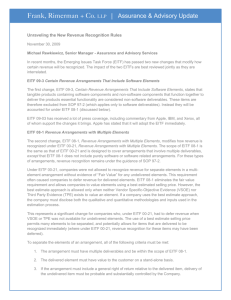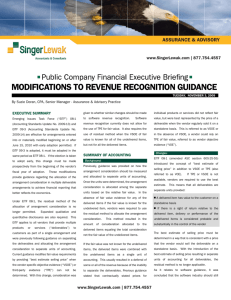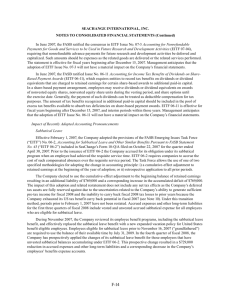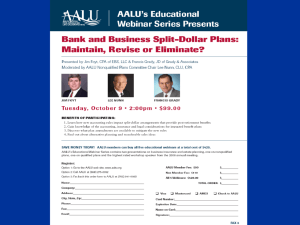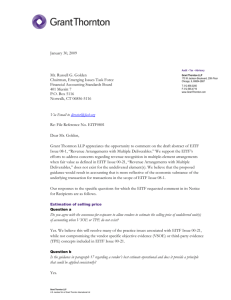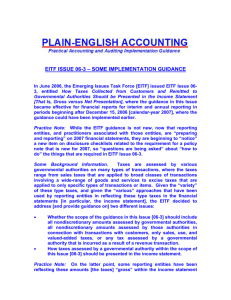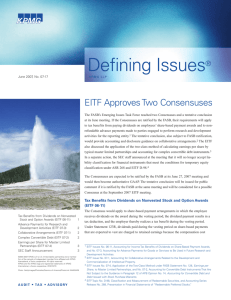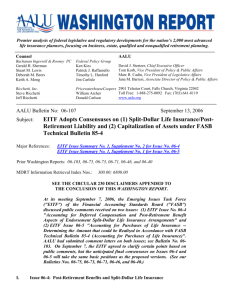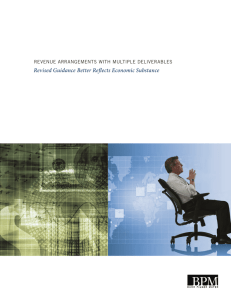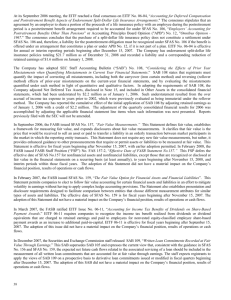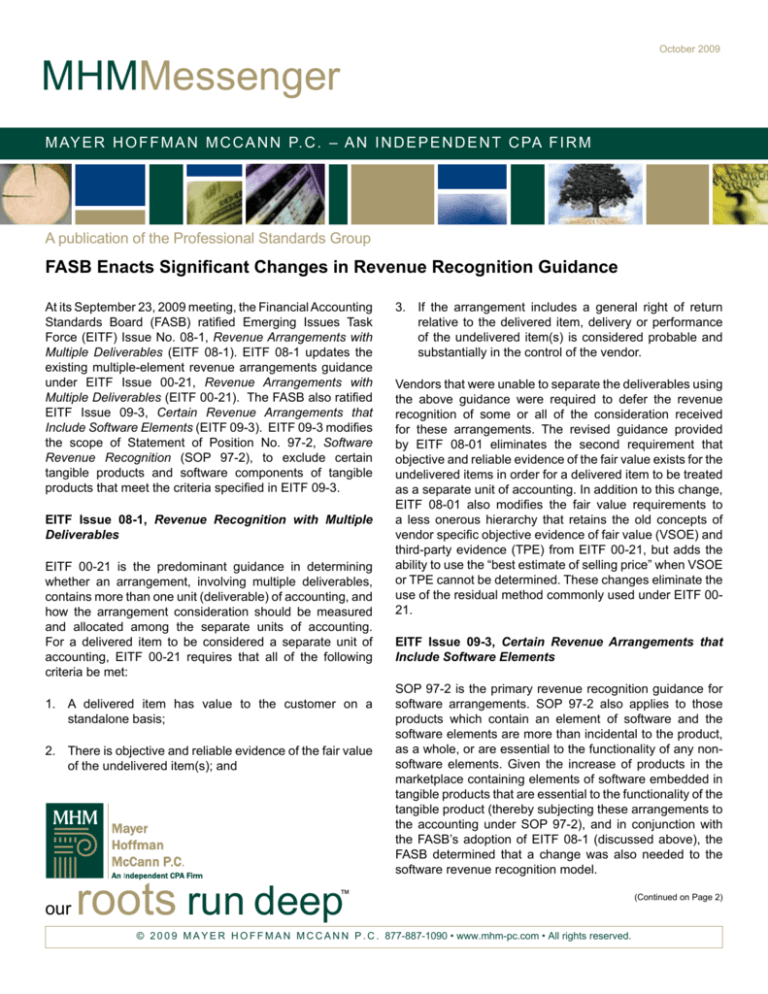
October 2009
MHMMessenger
M ay e r H offman M c Cann P. C . – A n I n d epen d ent C PA F i r m
A publication of the Professional Standards Group
FASB Enacts Significant Changes in Revenue Recognition Guidance
At its September 23, 2009 meeting, the Financial Accounting
Standards Board (FASB) ratified Emerging Issues Task
Force (EITF) Issue No. 08-1, Revenue Arrangements with
Multiple Deliverables (EITF 08-1). EITF 08-1 updates the
existing multiple-element revenue arrangements guidance
under EITF Issue 00-21, Revenue Arrangements with
Multiple Deliverables (EITF 00-21). The FASB also ratified
EITF Issue 09-3, Certain Revenue Arrangements that
Include Software Elements (EITF 09-3). EITF 09-3 modifies
the scope of Statement of Position No. 97-2, Software
Revenue Recognition (SOP 97-2), to exclude certain
tangible products and software components of tangible
products that meet the criteria specified in EITF 09-3.
EITF Issue 08-1, Revenue Recognition with Multiple
Deliverables
EITF 00-21 is the predominant guidance in determining
whether an arrangement, involving multiple deliverables,
contains more than one unit (deliverable) of accounting, and
how the arrangement consideration should be measured
and allocated among the separate units of accounting.
For a delivered item to be considered a separate unit of
accounting, EITF 00-21 requires that all of the following
criteria be met:
1. A delivered item has value to the customer on a
standalone basis;
2. There is objective and reliable evidence of the fair value
of the undelivered item(s); and
our
roots run deep
3. If the arrangement includes a general right of return
relative to the delivered item, delivery or performance
of the undelivered item(s) is considered probable and
substantially in the control of the vendor.
Vendors that were unable to separate the deliverables using
the above guidance were required to defer the revenue
recognition of some or all of the consideration received
for these arrangements. The revised guidance provided
by EITF 08-01 eliminates the second requirement that
objective and reliable evidence of the fair value exists for the
undelivered items in order for a delivered item to be treated
as a separate unit of accounting. In addition to this change,
EITF 08-01 also modifies the fair value requirements to
a less onerous hierarchy that retains the old concepts of
vendor specific objective evidence of fair value (VSOE) and
third-party evidence (TPE) from EITF 00-21, but adds the
ability to use the “best estimate of selling price” when VSOE
or TPE cannot be determined. These changes eliminate the
use of the residual method commonly used under EITF 0021.
EITF Issue 09-3, Certain Revenue Arrangements that
Include Software Elements
SOP 97-2 is the primary revenue recognition guidance for
software arrangements. SOP 97-2 also applies to those
products which contain an element of software and the
software elements are more than incidental to the product,
as a whole, or are essential to the functionality of any nonsoftware elements. Given the increase of products in the
marketplace containing elements of software embedded in
tangible products that are essential to the functionality of the
tangible product (thereby subjecting these arrangements to
the accounting under SOP 97-2), and in conjunction with
the FASB’s adoption of EITF 08-1 (discussed above), the
FASB determined that a change was also needed to the
software revenue recognition model.
™
© 2 0 0 9 M a y e r H offman M c Cann P . C . 877-887-1090 • www.mhm-pc.com • All rights reserved.
(Continued on Page 2)
MHMMessenger
(Continued from Page 1)
What This Means
EITF 09-3 changes the scope of SOP 97-2 for non-software
components of tangible products and software components
of tangible products that are sold, licensed, or leased
with tangible products when the software components
and non-software components of the tangible product
function together to deliver the tangible product’s “essential
functionality.” This change will result in more products
containing software and hardware being scoped out of the
software revenue recognition rules thereby resulting in an
accounting model for revenue recognition that more closely
mirrors the economics of the transaction. The example
below illustrates the change in revenue recognition with the
new guidance.
The modification of the guidance related to multiple element
arrangements and the recognition by the FASB of the impact
that software is having on the accounting for many tangible
products is anticipated to result in a better matching of the
accounting and economics related to many transactions.
We anticipate that in many situations revenue recognition
will occur at an earlier point in time compared to the
historical accounting practices of many companies. Both
EITFs 08-1 and 09-3 are effective for fiscal years beginning
June 15, 2010. Earlier adoption is permitted; however, if a
Company has revenue subject to both EITFs 08-1 and 093, both standards must be adopted. In the coming weeks,
MHM plans to publish additional in-depth guidance related
to the recent changes to the revenue recognition standards.
XYZ Company manufactures telephone systems, the
software component of the telephone systems is determined
to be more than incidental due to the additional features the
software provides. Due to the significance of the software
component, the accounting for this arrangement previously
was in accordance with SOP 97-2, as software. Upon
adoption of the new revenue guidance XYZ Company would
account for the telephone systems upon shipment provided
all other revenue recognition requirements are met.
The information in this MHM Messenger is a brief summary
and may not include all the details relevant to your situation.
Please contact your MHM service provider to further discuss
the impact on your financial statements.
© 2 0 0 9 M a y e r H offman M c Cann P . C . 877-887-1090 • www.mhm-pc.com • All rights reserved.

